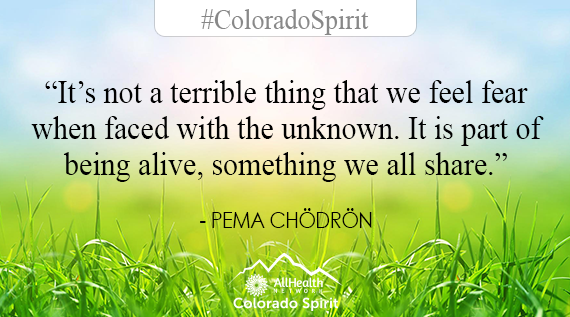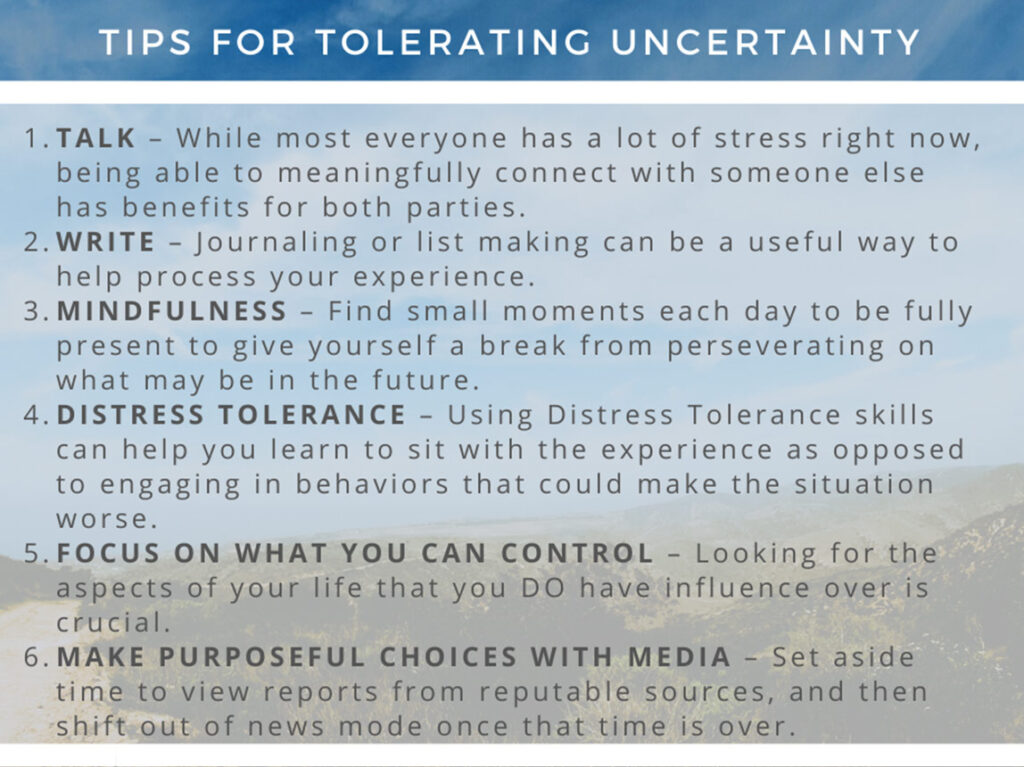Uncertainty – WOW! There is a lot of that in our lives right now. It is difficult to know what next week will look like, let alone several months from now. As humans, we all tend to have different tolerance levels for uncertainty. Some folks can roll with it a little smoother than others of us. The challenge right now is how much uncertainty we are dealing with. For most of us, uncertainty permeates multiple areas of our lives. This means, even the most tolerant of us are likely experiencing some strain.
Uncertainty can play out in different ways. Some of us may notice physical manifestations (headaches, stomach pain, etc.) others may experience emotional shifts like increased feelings of anxiety or sadness. We might even notice behavioral changes like snapping at other more or having trouble taking action. Regardless of how uncertainty is showing up for you, rest assured, you are not alone! Millions of us are in the same boat.
While nothing is likely to be certain and clear for quite some time, here are some strategies that might help:
TALK – when we feel alone with difficulty, the intensity of the experience increases. To counteract that, our best recommendation is to talk with trusted others. Whether this is a friend, family member, spiritual care provider, co-worker, or therapist, talking to someone who can really hear you and respond with empathy is crucial. Some of us might be reluctant to reach out for fear of burdening others with our experience. While most everyone has a lot of stress right now, being able to meaningfully connect with someone else has benefits for both parties. If you are not sure if someone is in a good place to connect, it is always OK to ask. Something as simple as, “Things are feeling hard right now. Can we talk?” can go a long way in helping ensure that someone is in a good space to be a support.
WRITE – Not all of us verbally process our experiences. For some of us, writing can be a helpful tool. You can journal or even write lists. NPR did a great piece on managing uncertainty that speaks to this and other great suggestions for dealing with uncertainty.
MINDFULNESS – While mindfulness is a form of meditation, in its most straightforward form, it is choosing where to direct your attention. Finding small moments each day to be fully present can give us a break from overthinking on what may be in the future. You can choose to be mindful of anything, but Pocket Mindfulness provides a few exercises you might try. There are also great books to help kids practice mindfulness. Check out this video of Mindful Monkey, Happy Panda by Lauren Alderfer.
DISTRESS TOLERANCE – A part of managing any difficult situation is tolerating the distress that arises without engaging in behaviors that can make the situation worse. While distress tolerance skills won’t solve a problem, they can help us sit with our experience. Some specific distress tolerance skills are outlined in Dialectical Behavior Therapy (DBT), an evidence-based treatment for many behavioral health issues. While we don’t recommend formal DBT treatment for everyone, the distress tolerance skills it teaches are AMAZING coping skills for any of us – behavioral health issues or not. We all have times when we cannot change our circumstances and we just need to tolerate the emotions that come up. Using distraction, self-soothing, improve the moment skills, and looking at pros and cons can help. Check out this blog post for an overview of these skills.
FOCUS ON WHAT YOU CAN CONTROL – While there is much about life these days that is out of our direct control, we know that finding points of self and community efficacy is critical to coping with stress. Looking for the aspects of your life that you DO have influence over is crucial. None of us are able to ensure we will not become ill, yet we can control our hand washing, mask-wearing, cleaning, and choices about where we spend our free time.
MAKE PURPOSEFUL CHOICES WITH MEDIA – we know…we keep saying this. But it bears repeating. There are countless headlines that, intentionally or not, stir up our uncertainty. There is a difference between viewing media reports to stay informed and getting sucked into the headlines and uncertainty. We recommend setting aside a little time each day to view reports from reputable sources, and then shifting out of news mode. Notice how you feel after your media time. If you are feeling unsettled, stirred up, or overly worried, it is worth considering if a change in your media habits might help.
Would speaking to someone help?
AllHealth Network, along with other community mental health centers, is continuing to provide services via telehealth and by phone. Our Crisis Walk-in Center remains open 24/7 and offers in-person care to those experiencing a mental health crisis. For more information and to get connected with our services, please call 303-730-8858. To learn more about what other community mental health centers are doing, please visit the Colorado Behavioral Health Council COVID-19 website.
If you are experiencing a mental health crisis and are in need of immediate assistance, please call the Colorado Crisis Hotline at 1-844-493-TALK (8255) or text TALK to 38255
How do you know if you’re experiencing a mental health crisis? Click here to learn about mental health crisis warning signs to look out for from the National Alliance on Mental Illness (NAMI)


